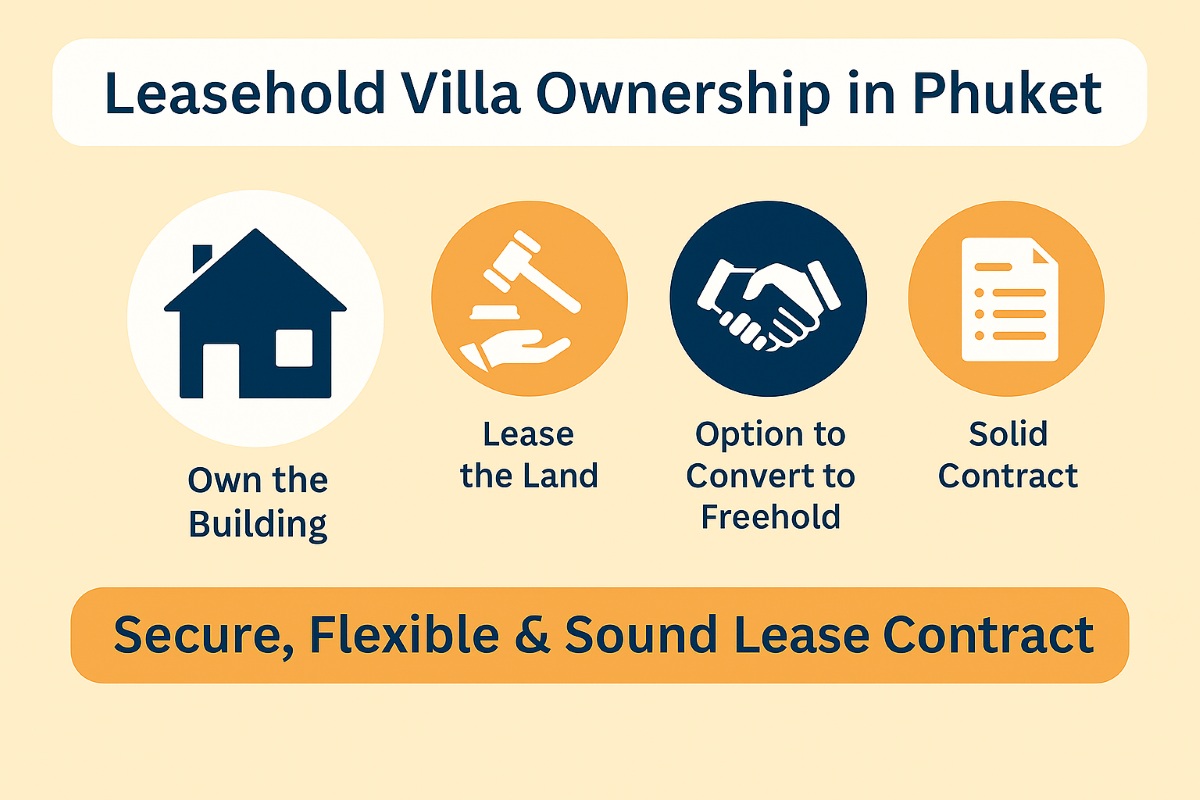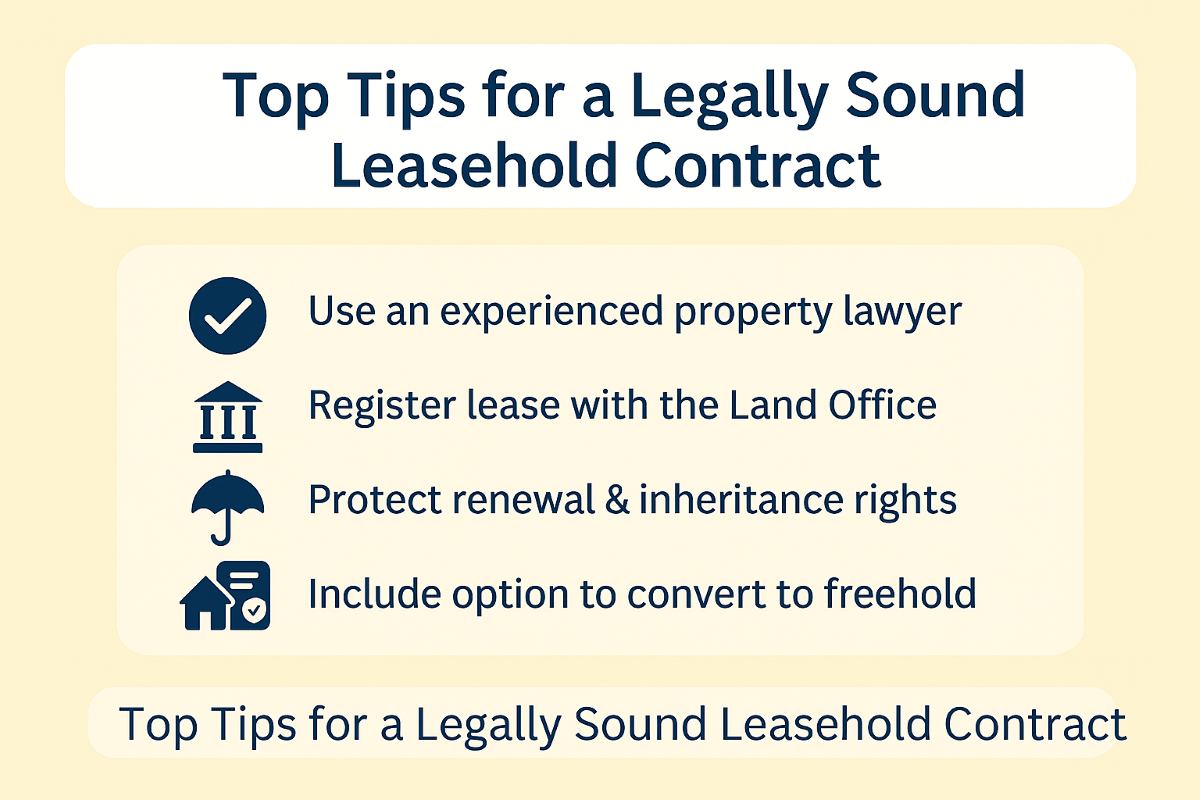Understanding Phuket Leasehold Ownership Structures
If you’re a foreigner exploring Phuket leasehold property, you’ve likely come across this term while researching ownership options in Thailand. In 2025, leasehold remains one of the most common and fully legal ways for non-Thais to hold homes, villas, and condominiums. This guide explains how the system works, what protections are essential, and how foreigners can approach leasehold agreements with clarity and confidence.
What Is Leasehold Ownership?
Under Thai law, foreigners cannot directly own land in their own name. However, they may lease land for up to 30 years. This is the foundation of Phuket leasehold property.
In many new projects, developers also provide the option to extend the lease for two additional 30-year terms. On paper, this can create a structure lasting as long as 90 years, though only the first 30 years is guaranteed by law. Extensions depend on the integrity of the developer and the wording of the lease contract.
Importantly, while the land is leased, the foreigner may legally own any villa, house, or structure built upon that land. This distinction makes Phuket leasehold property a flexible model, but only if contracts are drafted correctly and registered with the Land Office.
Why Leasehold Is Common in Phuket
The island’s high concentration of foreign residents has made Phuket leasehold property especially widespread. Developers and lawyers in Phuket are experienced at structuring leasehold agreements that comply with Thai law while providing security to foreign lessees.
Many villa estates and condominium developments are purposely designed with leasehold structures to make participation easier when freehold options are limited. For many foreigners, leasehold provides a practical entry point into Phuket real estate.
The Key to a Secure Leasehold Agreement
The foundation of a safe Phuket leasehold property arrangement is a well-drafted lease agreement. Too often, foreigners sign generic contracts that fail to provide adequate protection. A strong lease should:
-
Be prepared by an experienced Thai property lawyer.
-
Be registered at the Land Office for full enforceability.
-
Contain renewal clauses, inheritance rights, and clear conditions for transfer.
-
Provide the option to convert to freehold if the property is later sold to a Thai buyer or juristic person.
Without these protections, foreigners risk losing security over their leasehold rights.

Including an Option to Convert to Freehold
One of the most valuable clauses in a Phuket leasehold property contract is the right to convert to freehold. This option allows the lessee to transfer their leasehold title into freehold if the property is sold to a Thai national or Thai company.
This clause provides future flexibility, strengthens resale potential, and reassures both the current lessee and any future buyer. The contract must be worded with precision, and only a knowledgeable lawyer should draft it.
Ownership of the Building
A unique aspect of Phuket leasehold property is that foreigners can own the building constructed on leased land. Thai law does not prevent a foreigner from owning a physical structure, only the land beneath it.
To establish ownership of the building:
-
Ensure the building permit is in the foreigner’s name.
-
Keep receipts and contracts proving construction costs.
-
Register ownership of the building with the Land Office.
This separation between land and building strengthens security and adds flexibility for the foreign lessee.

Lease Registration and Legal Formalities
For a Phuket leasehold property, all lease agreements longer than three years must be registered at the local Land Office, part of the Thai Land Department, to be legally binding.
Registration is essential. Fees and stamp duty are usually split between the lessor and lessee. Once completed, the lease is enforceable for the full agreed term. Without registration, the contract may not be valid beyond three years, leaving the foreign lessee with limited protection.
Protecting Your Leasehold Property Long-Term
In addition to registration, several steps can improve the security of Phuket leasehold property:
-
Succession planning: Ensure the contract includes inheritance or assignment clauses. Back this up with a Thai will.
-
Avoid nominee arrangements: Using Thai nominees to hold land is illegal and carries serious risks.
-
Company structures: If a Thai company is used, it must be a genuine business operation with majority Thai ownership. Even then, risks remain and legal oversight is crucial.
-
Special Reciprocal Contracts (SRCs): Adding an SRC clause strengthens the lease by creating binding obligations that support renewals, assignment, and enforcement. This additional legal framework can make a Phuket leasehold property more secure for the long term.
Summary: Phuket Leasehold Property
-
Phuket leasehold property is capped at 30 years, with possible contractual renewals.
-
Foreigners may own the building but not the land.
-
Contracts must be carefully drafted and registered at the Land Office.
-
Clauses covering renewal, inheritance, and freehold convertibility are essential.
-
Leasehold offers access and flexibility but not outright ownership.
Related Guides
Conclusion
Phuket leasehold property remains a practical and fully legal pathway for foreigners to enjoy long-term use of villas, houses, or condominiums in one of Asia’s most sought-after locations. With a well-drafted lease agreement, registration at the Land Office, and strong legal protections, leasehold can provide peace of mind and security for decades.
Disclaimer: The information contained in this article is provided for general informational purposes only and does not constitute legal, financial, or investment advice. While every effort has been made to ensure accuracy at the time of publication, property laws and regulations in Thailand are subject to change. Readers should always seek independent legal advice from a qualified Thai lawyer before making any property-related decision or transaction.


Social Contact